Items tagged with 'jobs'
Albany Can Code has a new round of classes starting up soon

Albany Can Code -- the local initiative aimed at making training in computer coding available to a wider group of people -- has a new round of classes starting in January.
It will be offering front end web development classes -- "a solid foundation for anyone looking to explore a career in coding" -- at the Schenectady Community College extension in Albany and SUNY Adirondack in Wilton. And it also has a more advanced front-end Javascript frameworks class at SCCC in Schenectady.
From Albany Can Code's newsletter this month:
In 2018 we planned and executed 5 classes for 69 students in our workforce development program. These students learned Front End Web Development, JavaScript frameworks, Back End Web Development, and SQL Database skills. In the first quarter of 2019 we are planning to offer more classes than ever before. Nearly half of our students were women this year and more than a third were people of color.
The 12-week classes are $1,500 and there is some grant funding for people who meet various criteria. See the student FAQ for details.
Future jobs, done by humans and not
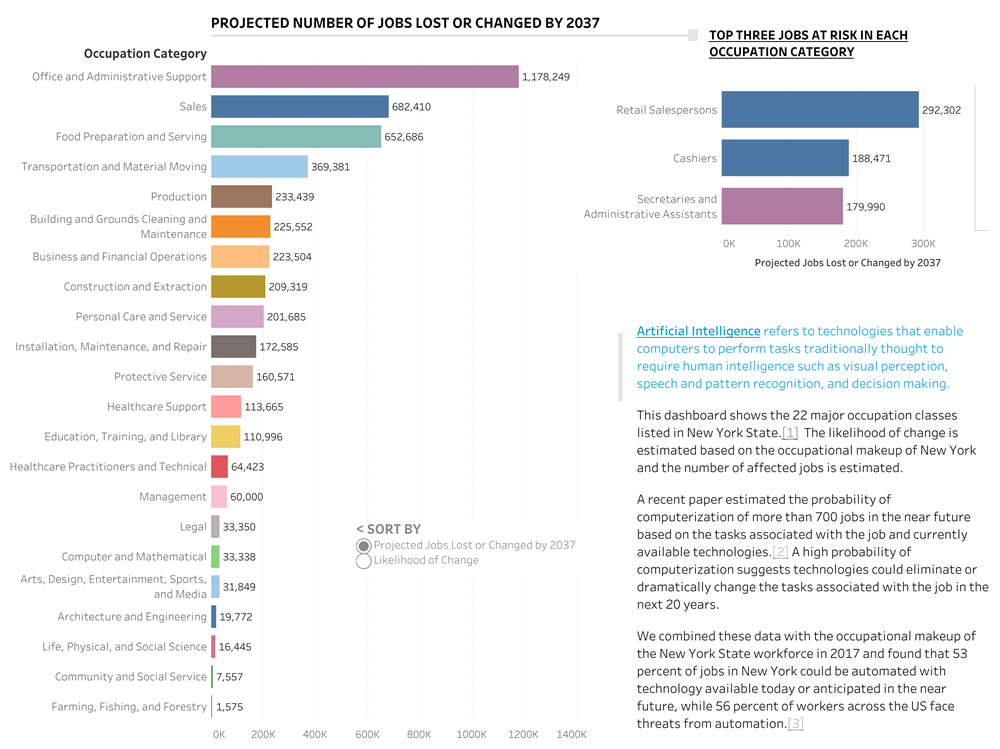
Roughly half of the jobs in New York State could be automated or otherwise significantly changed by artificial intelligence over the next 20 years. That's from an ongoing look at the issue by the Rockefeller Institute of Government here in Albany. From a post by Rockefeller's Laura Shultz:
The calculation is based on individual occupations. A recent paper by Frey and Osbourne estimated the probability of computerization of more than 700 jobs in the near future based on the tasks associated with the job and currently available technologies.[1] A high probability of computerization suggests technologies could eliminate or dramatically change the tasks associated with the job in the next twenty years. We combined these data with the occupational makeup of the New York State workforce in 2017 and found that 53 percent of jobs in New York could be automated with technology available today or anticipated in the near future, while 56 percent of workers across the US face threats from automation.[2]
Rockefeller has put together an interactive graphic that highlights the number of jobs -- by industry and type -- that could be affected around the state. (That image above is a static version of the graphic.) At the top of the list are office support, retail salespeople and cashiers, and food service -- potentially 2.5 million jobs lost or changed.
This struck us as a key clip from Shultz's post (emphasis added):
How the Albany metro area compares favorably to places such as Boston, DC, and Austin
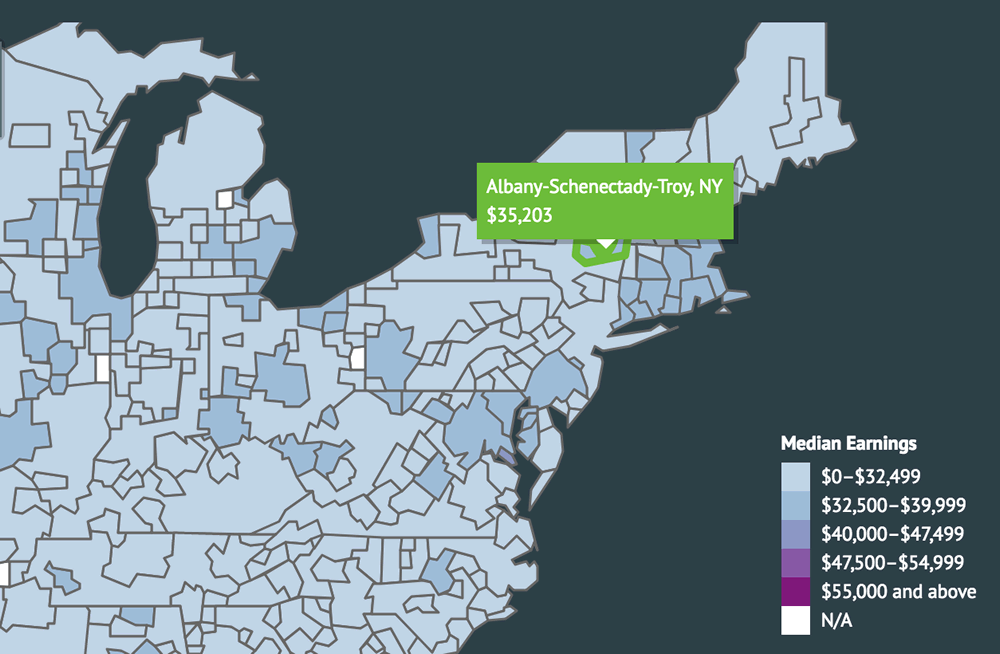
This is a screengrab from the Hamilton Project interactive visualization.
We were having a conversation the other day with someone about some of the things people who don't live here -- especially people from larger metros -- might not understand or appreciate about the quality of life here.
And one thing that immediately sprang to mind: There are (relatively) good job opportunities in the Albany metro area, and the (relatively) low cost of living means you can live here (relatively) comfortably without having to scrape like you would in a lot of big/coastal metros.*
That point is illustrated by this interesting interactive data visualization from The Hamilton Project at Brookings -- it depicts median income by occupation and age across the nation's 300some metro areas. (It's attached to an analysis aptly titled "Where Work Pays: How Does Where You Live Matter for Your Earnings?")
And here's the important thing: it gives you the option to adjust for cost of living and taxes.
So how's that work out for Albany?
Creative Economy Symposium 2018
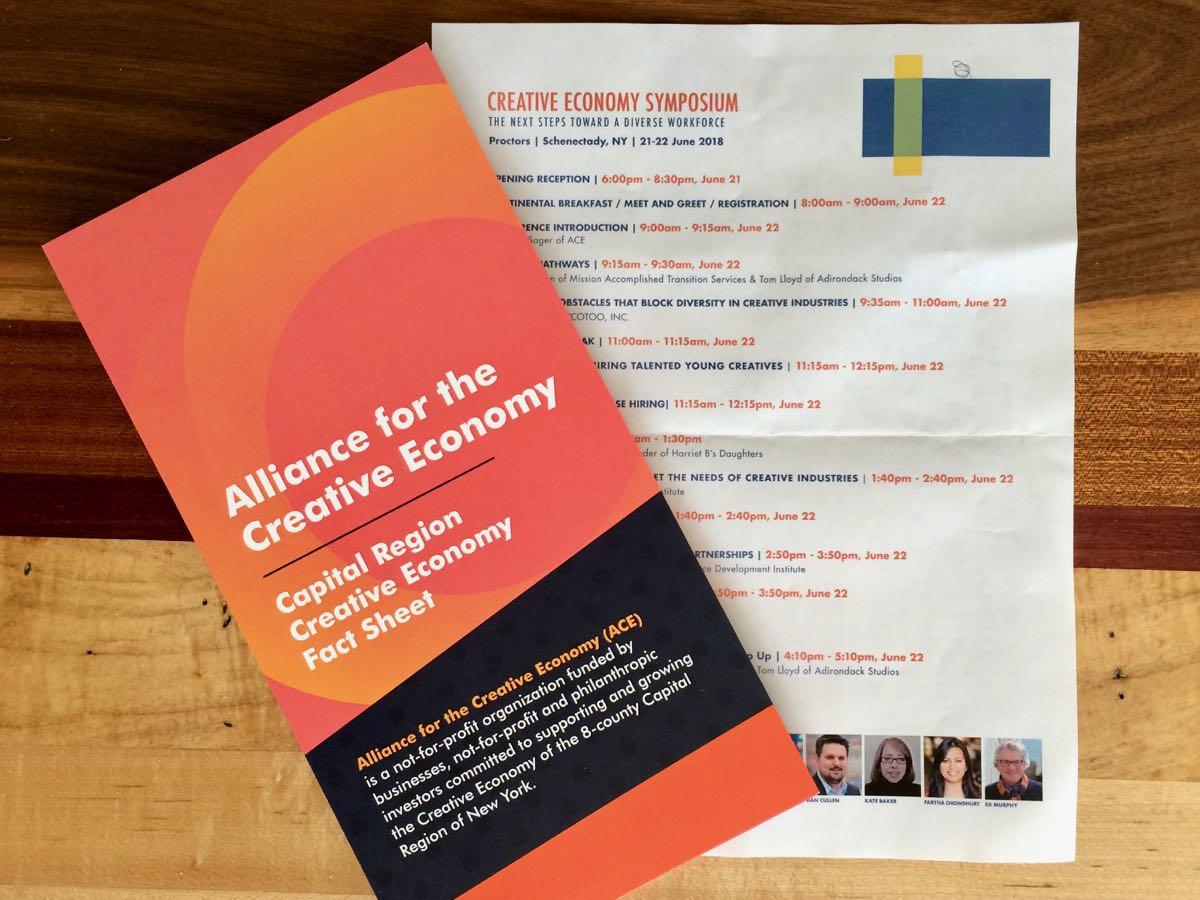
Proctors is hosting the second annual Creative Economy Symposium June 21-22. The topic for this year's event: "The Next Steps Toward a Diverse Workforce." Blurbage:
Join Upstate [Alliance for the Creative Economy], Workforce Development Institute, and the Themed Entertainment Association, global experts, and regional individuals, entities & industries in exploring critical issues relating to cultural, social and racial inclusion in Upstate New York's Commercial Creative Industries.
This 2nd Symposium in Schenectady involves Employees & Employers in Regional Creative Industries engaged in a conversation about overcoming obstacles, educational curriculum, hiring practices, job placement services, and career opportunities, rural & urban, leading us to a more diverse workforce.
Updated: A flyer with the schedule of events and speakers is embedded below. There's an opening reception that Thursday evening and then presentations/talks/discussions during the day on Friday.
Diversity in the local creative economy was the subject of a recent event at the Opalka Gallery this month. It was a good discussion, and there's a lot to talk about -- especially on how to turn intent into action and results.
The registration deadline for the symposium at Proctors is June 15. The fee is $40. (If that's maybe more than you can cover, we get the sense the organizers don't want to turn anyone away for not being able to pay -- so reach out to them.)
Applications open for AlbanyCanCode spring classes
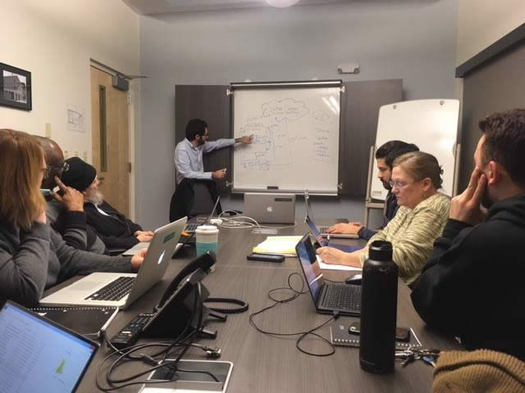
AlbanyCanCode -- the local non-profit focused on helping people transition into careers in software development -- is currently accepting applications for its spring courses. The application is a short online survey that asks a few biographical questions, along with few a skills assessment questions.
What is AlbanyCanCode? Blurbage:
AlbanyCanCode, was established in the summer of 2016 to serve two key stakeholder groups: local employers of software and IT professionals, and local folks who have the aptitude to work in software but lack local options for training. Our initial 12-week course in Front End Web Development attracted more than 80 applicants. A majority of the ten final students were income-qualified for a full grant of the $1,500 tuition. Following course completion in late January 2017, nearly half of our students have now been hired or are in the process of interviewing for internships at area software employers
The classes on the slate for this spring are front-end web development (HTML, CSS, JavaScript, jQuery, Bootstrap) and back-end web development (PHP, MySQL, Python, Ruby). (With those two groups of skills, you can build a bunch of stuff online.) The courses start in April.
And if you're an employer or educator, it sounds like AlbanyCanCode would be happy to hear from you about potential partnerships.
photo via AlbanyCanCode Facebook
The Capital Region leads Upstate in job growth
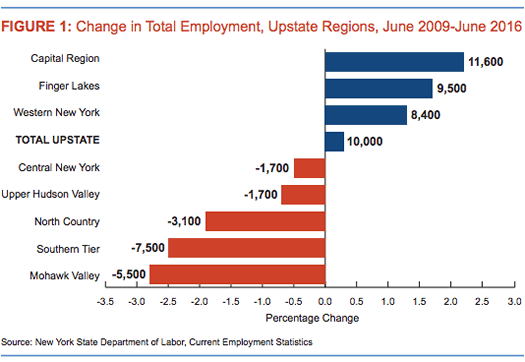
The Capital Region led Upstate New York* in employment grown between 2009 June and 2016 June -- that's from a new report by the state comptroller's office. The Capital Region* was up 2.2 percent over that period, while all of Upstate employment was up just 0.3 percent. It was one of just three (of eight) regions Upstate to see employment growth.
So... good for the Capital Region, right? Yep, but it's not all great.
Here are a few more interesting bits from the report about jobs Upstate...
5 bits about jobs in the Capital Region -- and how much they pay

We hear George does this job for free.
Which jobs in the Capital Region pay the most? Which pay the least? Which are the most common? Which are much more common here than other places?
Those are the sorts of questions to which we can an answer from a set of numbers of published by the federal Bureau of Labor Statistics. And, as it happens, the BLS released a new batch of those numbers this week.
And given all the recent discussion about New York State increasing its minimum wage, it seemed like a good time to pick out some bits from the new numbers.
The Capital Region's biggest employers are...

Can you guess? (This photo isn't really making it hard.)
Something we came across while doing research for that post earlier this week about the Capital Region jobs picture: The top 10 private sector employers for the Capital Region, as counted by the state Department of Labor.
Can you guess which companies are on the list?
A view of the Capital Region jobs picture
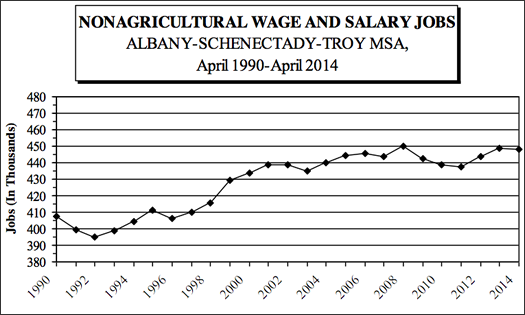
Graph via the NYS Department of Labor.
The Capital Region's unemployment rate was 4.8 percent in April, the state Department of Labor reported this week. That's down from 6.3 percent in April 2013. (The state's overall unemployment rate was 6.1 percent.)
Hooray, right?
Well, sort of. If you look at the numbers you'll also notice that the number of jobs in the Capital Region is also down so far this year.
So, what's going on?
My job as a barista

We got the impression that a lot of people found the anonymous job interviews we did for Work Week interesting, so we've decided to continue them as an occasional series.
On the job with: The Barista.
This person has been working in coffee for a decade -- as a barista, shift leader, and manager. The Barista talks about dealing with a stream of caffeine-seeking people, interpreting esoteric coffee lingo, and the people who camp out all day with their laptops...
Work Week: My job as an EMT
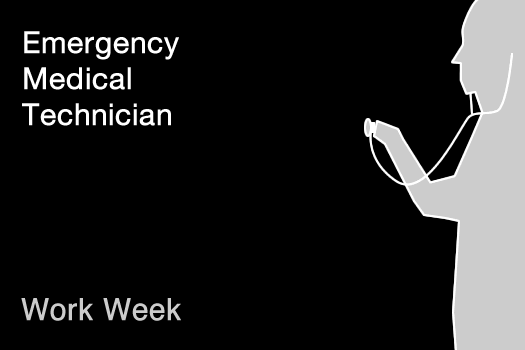
It's Work Week on AOA. We'll be talking with people about their jobs and working. Part of that includes anonymous conversations with people about what it's like to do their jobs.
Next Up: The EMT.
This Capital Region EMT talks about gray areas, problem drivers, and being woken up in the middle of the night...
Work Week: My job as a high school teacher
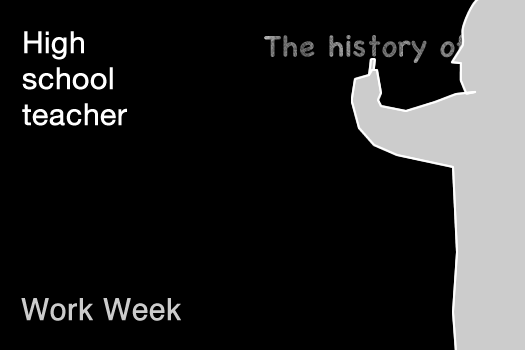
It's Work Week on AOA. We'll be talking with people about their jobs and working. Part of that includes anonymous conversations with people about what it's like to do their jobs.
Next Up: The High School Teacher.
Or, to be more precise, the former high school teacher. The High School Teacher retired in 2011, but is currently teaching teachers in a UAlbany graduate education program. He taught for more than 30 years in Saratoga and shares some thoughts on how education, students, and the job of a high school teacher changed in that time.
Work Week: Capital Region entrepreneurs on what they wish they'd known at the start

It's Work Week on AOA, which is pretty much what it sounds like -- we're talking with people about their jobs and working.
Starting something new -- making your own job -- is hard. Especially if it requires leaving a steady paycheck, an eight-hour workday and weekends off (though there seem to be fewer and fewer of those jobs these days). It means risking security, time, and often cash. It means being prepared to learn, and sometimes, to fail.
And the further you get into a new venture, the more you'll learn things you probably wished you'd known at the start. We talked with a handful of Capital Region people who took a chance and started something of their own -- to create a job for themselves -- and asked them one question: If you could go back in time, what advice would you give yourself before starting your venture?
Here's what they said...
Work Week drawing: For a day off
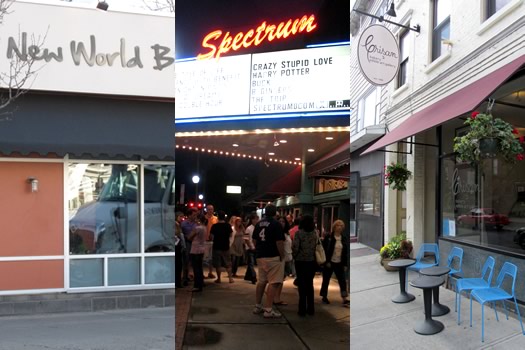
It's Work Week on AOA, which is pretty much what it sounds like -- we're talking with people about their jobs and working.
Drawing's closed!
As part of Work Week we figured it'd be fun to also include something for when you're not working -- whether it's a weekend (whenever your weekend might be), or the rare day off.
So, we pulled together three things that could go toward making a sweet day off:
+ A $50 gift card to New World Bistro Bar
+ Two tickets for a movie at the Spectrum
+ A $20 gift card to Crisan
To enter the drawing, please answer this question in the comments:
If you could have any job in the Capital Region, what it would be?
This could be an actual job -- or something you make up. We'll draw one winner at random.
Important: All comments must be submitted by 10 am on Friday, October 25, 2013 to be entered in the drawing. You must answer the question to be part of the drawing. (Normal commenting guidelines apply.) One entry per person, please. You must enter a valid email address (that you check regularly) with your comment. The winner will be notified via email by 5 pm on Friday and must respond by 5 pm on Monday, October 28.
Work Week: My job as a restaurant server
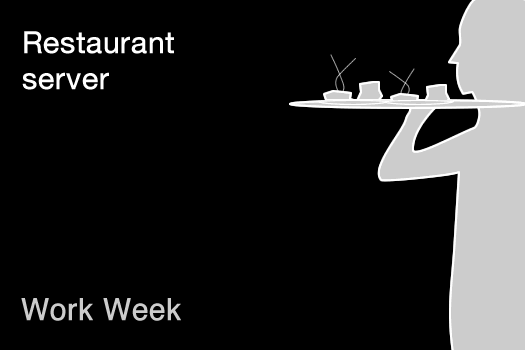
It's Work Week on AOA. We'll be talking with people about their jobs and working. Part of that includes anonymous conversations with people about what it's like to do their jobs.
Next up: The Restaurant Server.
While she currently divides her time between restaurants and a teaching job, the Restaurant Server has been in the restaurant business for 30 years, most of that time here in the Capital Region.
Work Week: Con Job
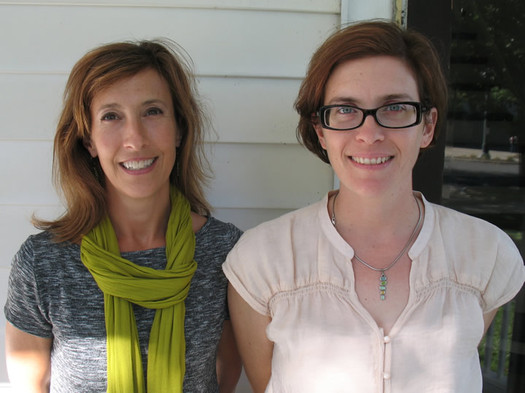
Megan Fulwiler and Jennifer Marlow, producers and directors of the Con Job project. Marlow on the way higher ed uses part-time professors: "I think we like to think of higher ed as protected from or different than that corporatization. ... But ultimately it's here and it's happening in the same way it's happening in many other sectors of the economy for the very same reasons."
It's Work Week on AOA, which is pretty much what it sounds like -- we're talking with people about their jobs and working.
When most of us think about the people who teach at colleges, we probably think of faculty with PhDs and tenure (or working toward it), teaching a few classes a semester, good pay, great job security, maybe a sabbatical.
In many situations, though, the reality of the higher education workforce is much different. Depending on how things are counted, somewhere between half and 3/4 of the people teaching in colleges and universities don't fit in that category of tenured or "tenure-track" faculty. They're part timers, "contingent labor." They're adjuncts.
Modern academia floats on a huge pool of people in this situation. In some cases, that's not a problem -- maybe it's a person teaching a course on the side of their regular job. But for many adjuncts, trying to piece together a full-time job and career, it can mean teaching multiple classes at multiple campuses for pay that approaches minimum wage levels with no benefits.
Prompted by growing restlessness by people in these jobs -- and in part by stories like this one recently in Pittsburgh -- there's a rising call to address the situation surrounding adjuncts in higher education.
Part of that attention is a documentary project titled Con Job: Stories of Adjunct and Contingent Labor, by two College of Saint Rose English professors: Megan Fulwiler and Jennifer Marlow. It aims to tell the stories of the adjuncts who teach first-year writing classes at many of the colleges in the Capital Region and beyond.
What they've found: people who say they feel invisible, living paycheck to paycheck, even as their labor makes the current system of modern higher education possible.
Work Week: My job as a retail clothing store manager

It's Work Week on AOA. We'll be talking with people about their jobs and working. Part of that includes anonymous conversations with people about what it's like to do their jobs.
First up: The Retail Clothing Store Manager.
She's worked at six retail stores during the past 16 years. And she has lots of stories -- about the good and bad of working with the public, a flesh-eating zipper, and people who have sex in the dressing room...
... said KGB about Drawing: What's something that brought you joy this year?